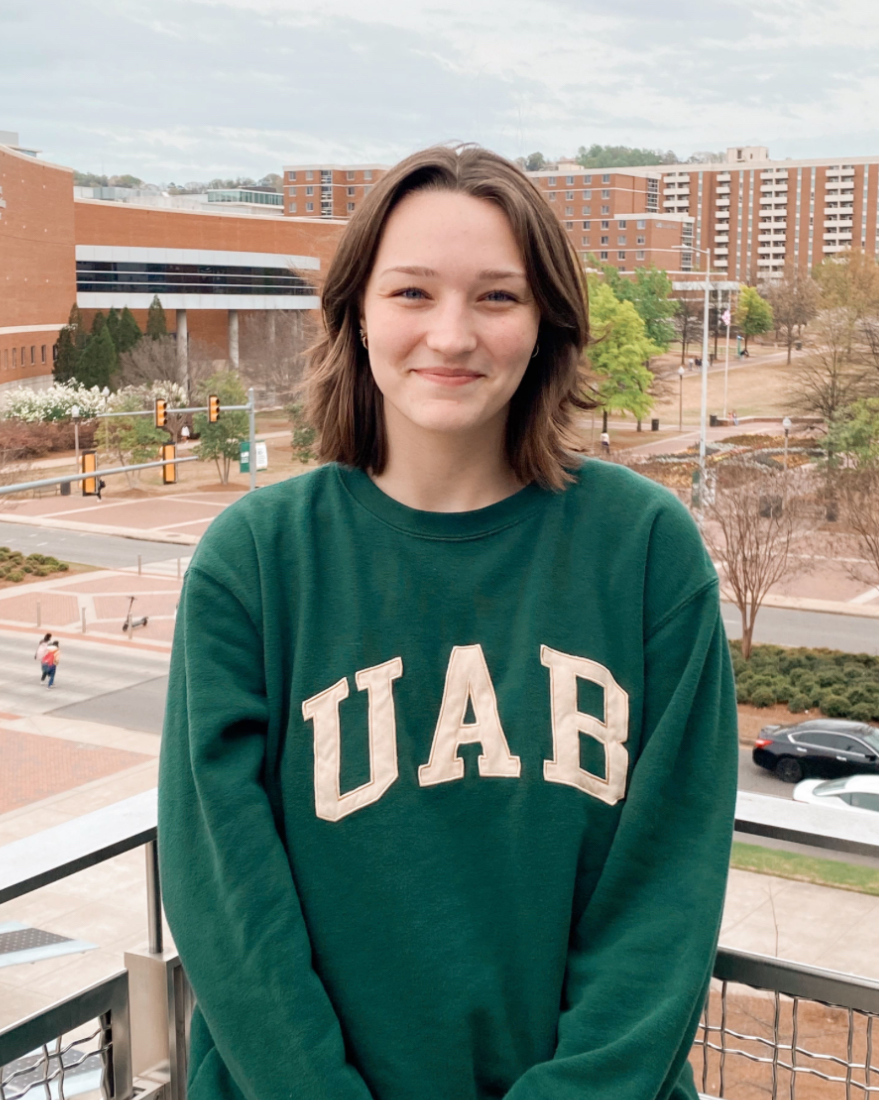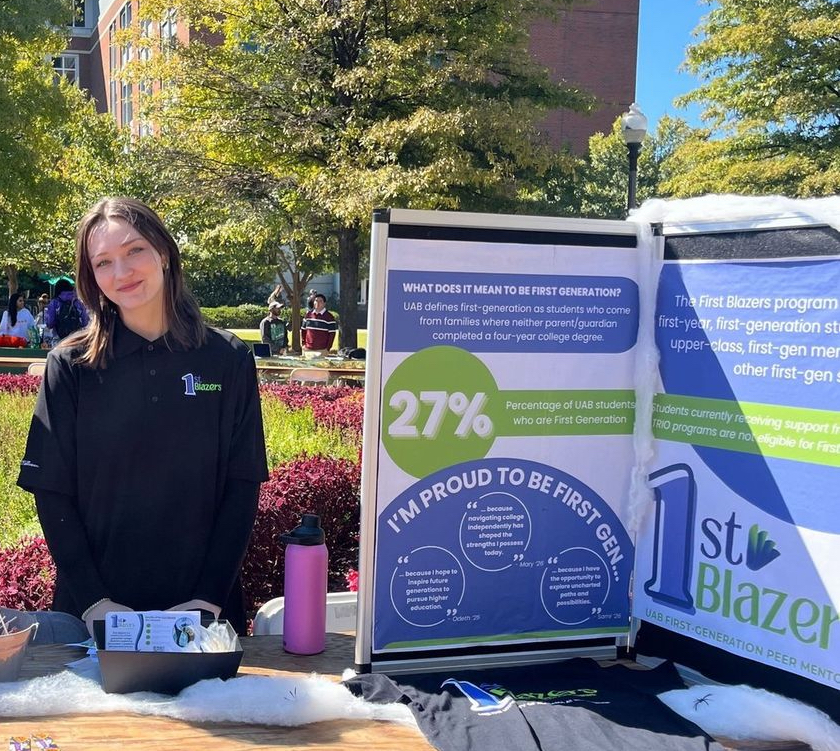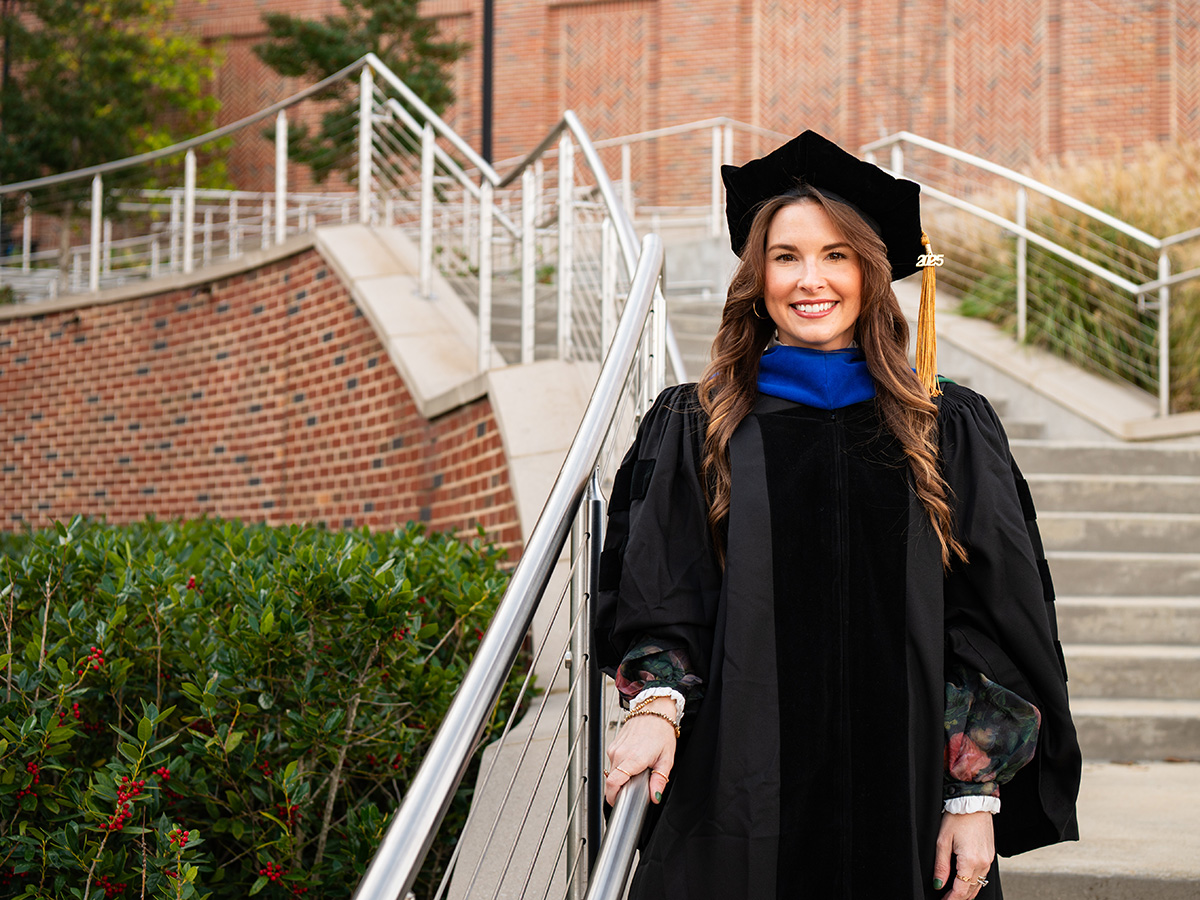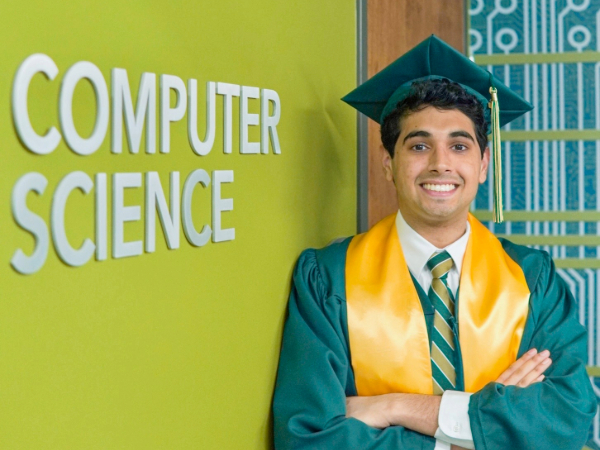 Kiersten Ratcliff is all-in on mathematics. Since choosing to attend the University of Alabama at Birmingham for her studies, Ratcliff—a sophomore in the Department of Mathematics Fast Track Program—has been exploring the many research and mentorship opportunities the department has to offer. Within her two years at UAB, Ratcliff has participated in advanced research with department faculty members and master’s students and also contributed to a series of projects that are set for journal publication in March 2025. Now, Ratcliff is preparing to present her research at the American Mathematical Society’s Joint Mathematics Meeting this January. Ratcliff’s accomplishments demonstrate just how fast the fast track program can accelerate students into meaningful careers—and she’s just getting started.
Kiersten Ratcliff is all-in on mathematics. Since choosing to attend the University of Alabama at Birmingham for her studies, Ratcliff—a sophomore in the Department of Mathematics Fast Track Program—has been exploring the many research and mentorship opportunities the department has to offer. Within her two years at UAB, Ratcliff has participated in advanced research with department faculty members and master’s students and also contributed to a series of projects that are set for journal publication in March 2025. Now, Ratcliff is preparing to present her research at the American Mathematical Society’s Joint Mathematics Meeting this January. Ratcliff’s accomplishments demonstrate just how fast the fast track program can accelerate students into meaningful careers—and she’s just getting started.
For Ratcliff, a Huntsville native, math was a subject she excelled in throughout grade school.
“I was always pretty decent at [mathematics],” said Ratcliff.
When attending James Clemens High School, Ratcliff progressed through courses like Calculus BC and AP Calculus BC. In addition, she studied Calculus III as a dual enrollment course at the University of Alabama in Huntsville.
Ratcliff’s love for math prompted her to explore math departments and their offerings from different colleges and universities. Her search would lead her to UAB for its math department, in-state location, and urban campus.
“[I]t’s also enough distance that I’m able to start practicing independence in real life,” Ratcliff added.
The transition from high school to college life was not always straightforward for Ratcliff. As a first-generation college student, there were occasions where she had to navigate the requirements of higher education on her own.
“I decided [to pursue] the many resources [at UAB] and take advantage of as many as possible,” Ratcliff explained.
 Kiersten Ratcliff tabling for the 1st Blazers student organization.One of the resources Ratcliff utilized was the First Blazers organization. The group offers peer mentorship for first generation students. Ratcliff, a mentee, spoke with her upperclassmen mentors to discuss the future and uncover possibilities––a theme that would echo into her studies in the Department of Mathematics.
Kiersten Ratcliff tabling for the 1st Blazers student organization.One of the resources Ratcliff utilized was the First Blazers organization. The group offers peer mentorship for first generation students. Ratcliff, a mentee, spoke with her upperclassmen mentors to discuss the future and uncover possibilities––a theme that would echo into her studies in the Department of Mathematics.
Although Ratcliff had a knack for solving and understanding mathematical concepts, the degree program initially appealed to her as a pit stop rather than a destination.
“I wasn’t sure if I wanted to do engineering, if I wanted to go into science, if I wanted to do something like pre-med. So, I started with math because I felt it would be an easy transition to anything,” said Ratcliff.
After taking several courses––including MA 252 “Introduction to Differential Equations” taught by Department Chair Milena Stanislavova, Ph.D.––Ratcliff discovered the versatility of math in real-life scenarios.
“I found math to be a useful tool on its own instead of just using it as a tool for physics or a tool for biology,” Ratcliff stated.
As her interest in the discipline increased, Ratcliff started to attend meetings within the department to learn about research opportunities. From there, she investigated the department’s Fast Track program and was drawn to its research offerings, mentorship opportunities, and overall structure (allowing students to earn a bachelor’s and master’s degree within four years). After she was accepted into the program, Ratcliff requested to join Stanislavova’s research during her second semester of freshman year.
Together, Ratcliff and Stanislavova conducted research on traveling waves through the perspective of differential equations. The process included Ratcliff taking a simplified differential equation and using it to analyze a subject.
“Working under Dr. Stanislavova at the end of freshman year was definitely a push because it was something that I wasn’t familiar with, but it was also really good because it connected well with [topics I knew],” Ratcliff said.
Seeing Ratcliff’s potential, Stanislavova alerted her to an opportunity to participate in a highly selective Research Experiences for Undergraduates (REU) program at Boston University. Ratcliff applied and was later accepted, attending the six-week program between June 10 – July 19 of this year.
“It was really awesome, and I felt like I learned a lot,” said Ratcliff.
Ratcliff studied under Ryan Goh, Ph.D., assistant professor at Boston University. Throughout the six weeks, Ratcliff researched the dynamic bifurcations of patterns with the goal of publishing the findings. During the first three weeks the team––consisting of Goh, Ratcliff, an undergrad student, and a doctoral student––focused on using man-made systems and investigating Turing patterns. In the following weeks, the group researched modulation analysis and the application of the Ginzburg-Landau equation.
“I was getting up at six in the morning and then I was going to bed at midnight doing math. I swear I was dreaming about math,” Ratcliff joked.
The culmination of research from Goh’s REU team is expected to be published in a journal in March.
Now in her sophomore year, Ratcliff has once again teamed up with Stanislavova. This time, Ratcliff will work on a team consisting of Department of Mathematics Professor Atanas Stefanov, Ph.D. and two graduate students.
“I never realized how social mathematics is,” said Ratcliff.
Now, with over three semesters of research experience, Ratcliff is ready for the next big thing. After making connections this summer during her time at Boston University, Ratcliff received a message from one of her teammates. They encouraged her to co-present their summer research at the American Mathematical Society Joint Mathematics Meeting in Seattle, Washington.
“At first, I was a nervous because I was like, ‘Seattle is an expensive plane ticket and expensive room and all the things.’ But then I asked around and the math department specifically has grants available for students interested in travelling and presenting their work,” explained Ratcliff.
With trip funds secured and the abstract submitted, Ratcliff will be joining her teammate this January to present their research during the three-day conference. While in Seattle, Ratcliff hopes to form connections with other mathematicians to learn about career opportunities.
“I like research and want to keep doing it,” she said. Following the Seattle trip, Ratcliff aspires to pursue her Ph.D. either in mathematics or her other love, economics. Regardless of the path she chooses, Ratcliff knows math will be involved.
To learn more about the Department of Mathematics and the Fast Track Program, click here.


